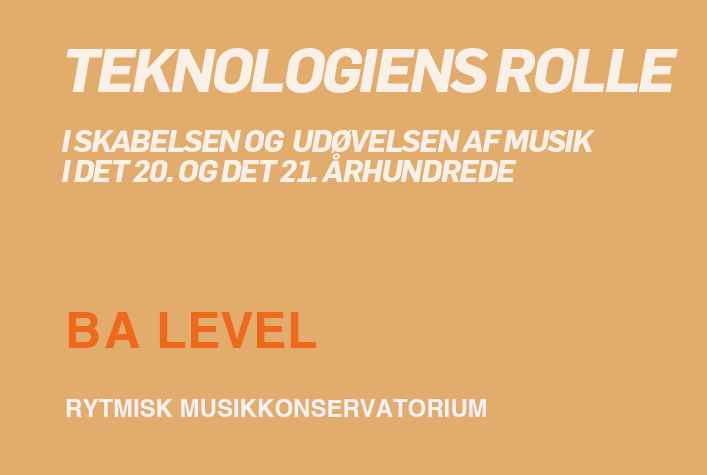
The role of technology in the creation and practice of music in the 20th and 21st centuries
Educator: Mimmi Bie
Contact person: Lene Christensen, lc@rmc.dk
The technological development of the music culture of the 20th and 21st centuries has helped to create completely new and unique opportunities for musical practice. But it has also resulted in major paradigmatic shifts in terms of how we understand the role of the artist and the essence of music. Technologies that e.g. includes recording, reproduction and amplification, invite us to completely new ways of understanding and producing music that inspires and shapes aesthetic expressions and basic musical experiences.
In this module, we will discuss how the role of technology can be understood as a definite actor that is co-creative in musical practice. Technology is not just something we use; it has a decisive influence on how we create and relate to music. Just think of how recording technologies have affected our ability to understand music as cut off from the specific pursuit e.g. in a concert context. Today, we can take for granted that music can be ubiquitous and that the relationship between the artistic unfoldment and the listening audience is highly democratized. But all this is rooted in technological development and is in itself conditioned by very special historical and cultural circumstances.
In addition, we will review reflections in these circumstances through lectures, text reviews and discussions. All of this is intended to stimulate students’ reflections on the theme’s relevance to their own musical practices.
PREREQUISITES
There are no formal prerequisites to attend this module except an interest in engaging with the subject area.
LEARNING OUTCOMES
By the end of the module, the student will:
- Have knowledge of the impacts of technological development and its significance in the western music of the 20th and 21st century; both in relation to the historical context and to contemporary relevance.
- Be able to reflect on the significance of these impacts for their own music as well as educational profile and practice.
- Be able to convey the information taught during this course in the form of a short final assignment in a way that illustrates a complete understanding of the subject field and an ability to work independently with the material
- Have gained insight into the overall ‘location’ of Danish music in the bigger picture of popular music.
CONTENTS
During the course, the role of technology is explored through a review of four key themes:
1) The recording: Questions about mediation, both visible and invisible, are exposed, just as the investigation into what consequences this has for the understanding of music when it can be experienced as cut off from actual musical practice.
2) Amplification: we investigate what effect the amplification has on especially aesthetic expressions.
3) The recording studio: we examine the role of the studio in understanding the origin of music. What significance does this framework, which on the surface can be interpreted as a neutral setting, have for musical practice? What does it mean that music production has gradually been virtualized?
4) Reproduction: We will circle around the relationship between originality and copy, and how it affects the way we relate to e.g. sampling as artistic practice and authenticity as a musical cultural value concept.
NIVEAU
BA
TIME
One semester, 2 hours per week, likely on Fridays (not scheduled yet)
ECTS
2,5 ECTS
TEACHING AND WORKING METHODS
- Lectures
- Short oral presentations
- Reflection exercises and discussion
GROUP FORMATION
Usually 8-9 students
ASSESSMENTS
The assessment will be made based on a reflection essay (in writing), alternatively a podcast. A self-chosen topic must be explained within the framework of the module’s topics in the form of a reflection essay of 5 standard pages or a podcast with a duration of 10 minutes.
The essay must include a minimum of five source references, of which a minimum of two must be included in the source list for the module. This requirement also applies to podcasts.
Students with a mother tongue other than Danish can submit the assignment in Scandinavian or English. The essay is submitted in WISEflow before the deadline set by the Study Administration.
REFERENCES
The course themes are built upon four central texts from the newly published Bloomsbury Handbook of the Anthropology of Sound (2021):
1) Seay, Toby: “The Recording,” in Holger Schulze (red.): Bloomsbury Handbook of the Anthropology of Sound, Bloomsbury Academic, 2021. 339-352.
2) Maier, Carla J.: “The Amplification,” in Holger Schulze (red.): Bloomsbury Handbook of the Anthropology of Sound. Bloomsbury Academic, 2021. 353-368.
3) Barnard, Matthew: “The Studio,” in Holger Schulze (red.): Bloomsbury Handbook of the Anthropology of Sound. Bloomsbury Academic, 2021. 369-384.
4) Bach, Anders: “The Reproduction,” i Holger Schulze (red.): Bloomsbury Handbook of the Anthropology of Sound. Bloomsbury Academic, 2021. 385-400.
The main texts are supplemented with texts from, for example, the following works:
Fleischer, R., Snickars, P., Vonderau, P., Eriksson, M. (2019): Spotify Teardown: Inside the Black Box of Streaming Music, Cambridge/Mass. MIT-Press.
Gopinath, S. & Stanyek, J. (2014): The Oxford Handbook of Mobile Music Studies, Volume 1 & 2, Oxford/UK: Oxford University Press.
Kassabian, A. (2013): Ubiquitous Listening: Affect, Attention, and Distributed Subjectivity, Berkeley: University of California Press.
Manning, Peter (2004): Electronic and Computer Music, Oxford University Press.
TIME
One semester, 2 hours per week, likely on Fridays (not scheduled yet)
PLACE
Rhythmic Musicconservatory
ONLINE
No
NIVEAU
BA
ECTS
2,5 ECTS
LANGUAGE
Danish / English
REGISTRATION
If you wish to participate in one of the TVAERS courses, you need to register 1 or 2-course requests.
Before the course start, you will be notified if you can be offered a place on a module.
Registration opens on June 3rd.
The deadline for registration for the fall semester of 2022 is 17 June
You register by this link
